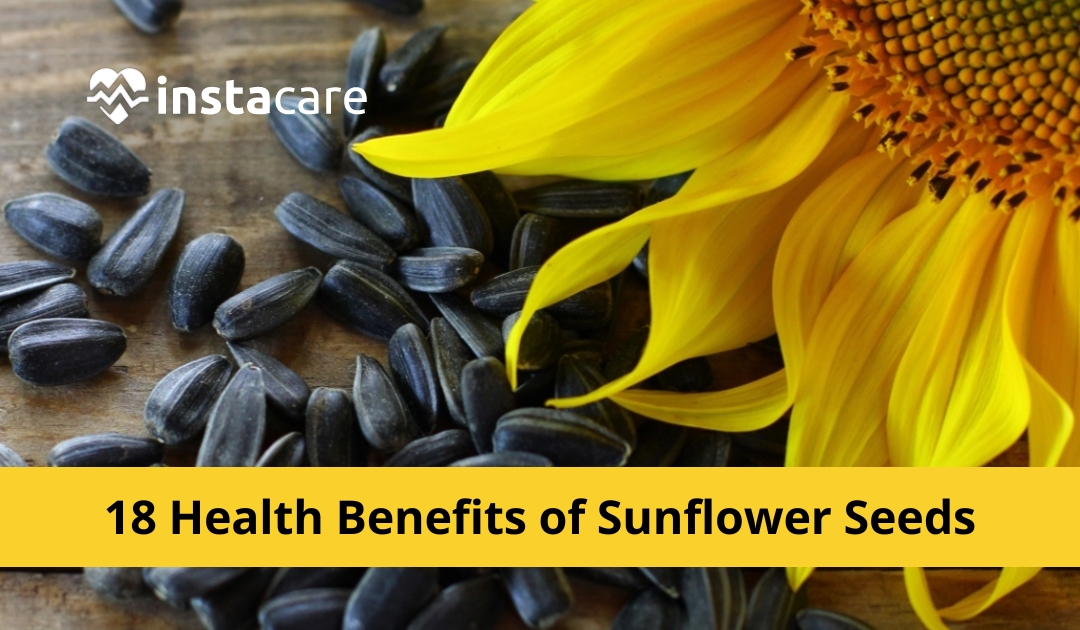When it comes to healthy snacks, sunflower seeds are often a
go-to option for both men and women looking to get an extra boost of energy.
Not only do these crunchy little morsels provide essential vitamins and
minerals when eaten in moderation (one ounce contains about 170 calories), but
they may also have other potential health benefits due to their high levels of
antioxidants. Here's what you need to know about the various benefits that
sunflower seeds can offer — from increased fiber intake, lower cholesterol
levels, better heart health, improved vision, and more!
What are sunflower seeds?
Sunflower seeds are the edible seeds of the sunflower plant. They are a popular snack that is both tasty and nutritious. These small seeds are rich in a variety of vitamins and minerals, such as vitamin e, magnesium, and selenium.
They also contain a high amount of healthy fats, protein, and fiber. Eating sunflower seeds can have many benefits for your health. For example, they may improve heart health, boost your immune system, and even help with weight loss. Whether you enjoy them as a snack or add them to your meals, sunflower seeds are a great way to incorporate healthy nutrients into your diet.
Nutrition value of sunflower seeds
Sunflower seeds are a tiny powerhouse of nutrition that can provide numerous benefits for your health. They are loaded with healthy fats, fiber, protein, vitamin e, and minerals like phosphorus, magnesium, selenium, and zinc. These nutrients work together to support many aspects of your health, including heart health, digestive health, and immune function.
For example, the healthy fats in sunflower seeds can help lower bad cholesterol levels in your blood, while the fiber can improve digestion and help you feel fuller for longer. Additionally, the vitamin e and minerals in sunflower seeds have antioxidant properties that protect your cells from damage caused by free radicals. Incorporating sunflower seeds into your diet is an easy way to boost your nutrition and enjoy a delicious snack.
Benefits of sunflower seeds
1- Reducing inflammation
Inflammation is a common issue for many people, and reducing it is a necessary step towards a healthier lifestyle. Thankfully, there are many foods that can help fight inflammation naturally, and one of these is sunflower seeds. These tiny seeds pack a big punch when it comes to health benefits, including reducing inflammation. Sunflower seeds are high in vitamin e, a powerful antioxidant that helps to protect cells from damage. They also contain phytochemicals, which are natural compounds that help to reduce inflammation in the body.
In addition to their anti-inflammatory properties, sunflower seeds can also help to lower cholesterol and blood pressure, making them a great choice for anyone looking to improve their overall health. So the next time you're looking for a healthy snack, reach for a handful of sunflower seeds and enjoy the many benefits they have to offer!
2- A powerhouse of energy
Sunflower seeds are truly a powerhouse of energy. Beyond being a tasty snack, they are incredibly nutritious and packed with a range of benefits. These tiny seeds are loaded with protein, healthy fats, and fiber, making them the perfect addition to any healthy diet. They are also a great source of a variety of vitamins and minerals, including vitamin e, magnesium, and selenium.
And, on top of all of that, sunflower seeds have been shown to have numerous health benefits, from reducing inflammation to boosting heart health. So why not add some to your meals, your baked goods, or just munch on them plain for a quick energy boost? Your body will thank you.
3- Improving heart health
Heart disease is the leading cause of death in the United States. However, there are steps individuals can take to improve their heart health and potentially reduce the risk of heart disease. One simple way to achieve this is by incorporating sunflower seeds into your diet. These tiny seeds pack a big nutritional punch and are a rich source of healthy fats, protein, fiber, and antioxidants.
Research has also shown that consuming sunflower seeds may help lower cholesterol levels and blood pressure, both of which are key factors in maintaining a healthy heart. So, whether you sprinkle them on your morning oatmeal or enjoy them as a snack on their own, adding sunflower seeds to your daily routine may be a small but effective step towards improving your heart health.
4- Boosts function of brain
Looking to boost the function of your brain? Look no further than sunflower seeds! These tiny, nutritional powerhouses are packed with benefits that can help keep your brain sharp and functioning at its best. Sunflower seeds contain high levels of vitamin e, which has been linked to improved brain function and decreased risk of cognitive decline.
Additionally, they are loaded with minerals like magnesium and zinc, which are essential for proper brain function. Whether eaten as a snack or added to salads and other dishes, incorporating sunflower seeds into your diet is an easy way to give your brain the boost it needs to stay healthy and sharp.
5- Supporting the immune system
Maintaining a strong immune system is crucial for good health, and one way to achieve this is by consuming sunflower seeds. Packed with essential nutrients such as vitamin e, magnesium, and selenium, these small but mighty seeds are known for their immune-boosting properties. Vitamin e is a powerful antioxidant that helps protect cells from damage, while magnesium supports the body's natural defense systems.
Selenium, a mineral found in sunflower seeds, plays a crucial role in the proper functioning of the immune system. In addition to its numerous health benefits, sunflower seeds are a convenient snack that can be easily added to salads, trail mix, or enjoyed on their own. So, if you're looking to support your immune system, grab a handful of sunflower seeds today!
View More: The Surprising Benefits Of Wheat Flour For Men Women And Health Lovers
6- Diabetes
Diabetes is a chronic condition that occurs when the body is unable to properly process glucose in the blood. Although there is no known cure for diabetes, there are ways to manage the condition and reduce the risk of complications. One of the most effective ways to manage diabetes is through a healthy diet that includes foods that offer numerous health benefits.
One such food is sunflower seeds, which have been linked to numerous health benefits. These tiny seeds are packed with essential nutrients, including vitamin e, magnesium, and niacin, all of which can help reduce inflammation, improve heart health, and even boost brain function.
Sunflower seeds are also a great source of fiber, which can help regulate blood sugar levels and reduce the risk of developing diabetes. Overall, adding sunflower seeds to your diet can be a simple and effective way to support your overall health and reduce your risk of developing diabetes-related complications.
7- Helps in treatment of anaemia
Sunflower seeds are an often-overlooked superfood that boasts numerous health benefits. One of these benefits is their ability to help in the treatment of anaemia. Anaemia occurs when there is a lack of healthy red blood cells in the body, and sunflower seeds are rich in the nutrients that promote the production and regeneration of these crucial cells.
Specifically, these tiny seeds are a great source of iron, which is essential for the formation of haemoglobin, a protein that transports oxygen in the blood. They are also loaded with vitamin e, which plays a vital role in protecting red blood cells from damage and premature destruction. So, if you're looking for a natural way to boost your iron levels and combat anaemia, adding sunflower seeds to your diet is a great place to start!
8- Reduces cholesterol
Sunflower seeds have numerous health benefits, one of which includes reducing cholesterol levels in the body. These seeds are a great source of plant-based compounds, such as phytosterols, which compete with cholesterol for absorption in the gut. This competition leads to a decrease in cholesterol levels, specifically the "bad" cholesterol or ldl.
In addition to aiding in cholesterol reduction, sunflower seeds are packed with essential nutrients, such as vitamin e, magnesium, and selenium, making them an excellent addition to any healthy diet. Incorporating a handful of sunflower seeds into your daily routine can provide a nutritious boost and contribute to a healthier heart.
9- Cardioprotective effects
Cardioprotective effects refer to the actions that protect the heart against disease or damage. These effects are often brought about by certain foods, such as sunflower seeds, which contain potent nutrients that support a healthy heart. Sunflower seeds have been shown to help reduce cholesterol levels in the body and promote healthy blood pressure levels, both of which are essential for a healthy heart.
Additionally, sunflower seeds are rich in antioxidants that help prevent oxidative stress, a process that can damage the heart and other organs. Incorporating sunflower seeds into your diet can be a great way to enjoy their benefits and support your heart health.
10- Reduces risk of cancer
Sunflower seeds are more than just a tasty snack - they also come with a range of health benefits, including reducing the risk of cancer. These little seeds are packed with nutrients that have been shown to have anti-cancer effects, such as vitamin e, selenium, and phytochemicals.
Specifically, studies have found that sunflower seeds can help inhibit the growth of certain types of cancer cells, including breast, lung, and colon cancer. Incorporating sunflower seeds into your diet is an easy and delicious way to support your health while reducing your cancer risk. So next time you're looking for a healthy snack, reach for a handful of sunflower seeds - your body will thank you.
11- Boosting energy levels
Many of us have experienced the mid-afternoon slump where our energy levels start to dip. But did you know that snacking on sunflower seeds can help give you a much-needed boost? These tiny seeds are packed with nutrients such as vitamin e, magnesium, and protein, which help to regulate blood sugar and boost energy levels.
In addition, sunflower seeds are also a great source of healthy fats, which keep you feeling full and satisfied for longer periods of time. So the next time you find yourself feeling sluggish, reach for a handful of sunflower seeds and enjoy the natural energy boost they provide.
12- Helps to detox our body
Detoxifying our body has become an essential aspect of maintaining overall health and wellness. From fad diets to juice cleanses, we are always looking for new ways to cleanse our systems. However, one of the most natural and effective ways to detox our body is by incorporating sunflower seeds into our diet.
The benefits of sunflower seeds are endless; they contain essential nutrients such as magnesium, vitamin e, and selenium. These nutrients help reduce inflammation, protect cells from damage, boost immunity, and improve digestion. The high fiber content of sunflower seeds also helps promote bowel regularity and remove toxins from the body. Considering these powerful benefits, adding a handful of sunflower seeds to your diet can help you achieve a healthier, detoxified body in no time!
13- Sunflower seeds benefits for weight loss
Sunflower seeds are a highly sought after snack option, and for good reason! These little seeds have packed with numerous health benefits, including aiding in weight loss. Sunflower seeds contain fiber and protein, which both play key roles in making us feel full and satisfied for longer periods of time.
Additionally, they are low in calories, making them a perfect snack to help curb those mid-day hunger cravings. But the benefits don't stop there - sunflower seeds are also rich in unsaturated fats, vitamins, and minerals that can support a healthy diet and lifestyle. Whether eaten whole or added to salads and other dishes, sunflower seeds are a delicious and nutritious option for anyone looking to lose weight and improve their overall health.
14- Sunflower seeds benefits for hair
Sunflower seeds contain a variety of hair-nourishing nutrients that can enhance the health and vitality of your locks. These small but powerful seeds are a rich source of vitamin e, a potent antioxidant that helps protect your hair from damage and promotes healthy growth. They also contain essential fatty acids, which help to keep your scalp moisturized and nourished.
In addition, sunflower seeds are packed with protein and amino acids, which are essential building blocks for strong, resilient strands. Whether eaten as a snack or used in hair care products, sunflower seeds can provide a host of benefits for your hair. So, if you're looking for a natural way to support healthy, beautiful hair, be sure to add sunflower seeds to your diet or grooming routine.
15- Sunflower seeds benefits for skin
Sunflower seeds might be small, but the benefits they offer to our skin are impressive. These nutrient-dense seeds are loaded with vitamins e and b-complex, minerals like magnesium, selenium, and copper, and healthy fats. When consumed or applied topically, the antioxidants in sunflower seeds protect our skin from environmental stressors such as uv rays and pollution, minimizing the damage and premature aging due to free radicals.
Additionally, the phytosterols contained in these seeds strengthen the skin's lipid barrier, improving hydration and reducing inflammation, translating to plumper and younger-looking skin. With all these benefits, it is no surprise that sunflower seeds have become a go-to ingredient among natural skincare enthusiasts.
16- Sunflower seeds benefits for pregnancy
Pregnancy is a time of excitement, anticipation, and often, a heightened awareness of the nutrients we consume. Did you know that incorporating a handful of sunflower seeds into your diet could have significant benefits for both you and your growing baby? These tiny seeds are packed with essential vitamins and minerals, including folate, vitamin e, and zinc, which have been shown to support fetal development and improve maternal health outcomes.
Additionally, their high healthy fat content can aid in brain and eye development for your little one. So next time you're looking for a healthy snack option that provides a plethora of nutrients, consider reaching for a handful of nutritious sunflower seeds.
17- Sunflower seeds benefits for male
Sunflower seeds are a nutritional powerhouse that offer several benefits for male health. These tiny seeds are an excellent source of vitamin e, zinc, and selenium, which are essential nutrients for maintaining healthy testosterone levels. Sunflower seeds are also rich in healthy fats, including omega-3 and omega-6 fatty acids, which can improve heart health and reduce inflammation.
In addition to their nutritional benefits, sunflower seeds can also support weight loss and improve mood due to their high fiber and magnesium content. Adding sunflower seeds to your diet is a simple and delicious way to promote overall male health.
18- Sunflower seeds benefits for female
Sunflower seeds are a nutrient-dense food that boasts a plethora of benefits for women. These seeds are a powerhouse of essential nutrients, including vitamin e, magnesium, and selenium that are essential for maintaining bone health, preventing heart disease, and improving sleep.
Women who incorporate sunflower seeds into their diet may also experience a reduction in the severity of premenstrual syndrome (pms) symptoms, due to the presence of phytoestrogens that mimic natural estrogen in the body. Additionally, sunflower seeds have antioxidant properties that can help to prevent some types of cancer and combat aging. Overall, sunflower seeds are an excellent food choice for women, delivering a range of health benefits to support optimal wellbeing.
How to eat sunflower seeds
Sunflower seeds are a nutritious snack that not only satisfy your hunger, but also provide various health benefits. Packed with nutrients such as protein, fiber, healthy fats and minerals, they can help you improve digestion, lower cholesterol levels and reduce inflammation. The key to enjoying sunflower seeds is knowing how to eat them. To start, crack the shell open with your teeth and remove the seed with your tongue or fingers.
Alternatively, you can buy shelled sunflower seeds, which are more convenient to eat. Sprinkle them on your salads, yogurt or smoothies for an added crunch, or simply snack on them during the day. By incorporating sunflower seeds into your diet, you can reap their many benefits and improve your overall health.
Comparison of sunflower seeds with pumpkin seeds
Sunflower seeds and pumpkin seeds, both members of the same family, have been enjoyed as a delicious snack for centuries. Although they share similar nutrient profiles, it's fascinating to weigh their differences and understand how each seed benefits people in their own way. Sunflower seeds, for instance, are famous for their nourishing properties, making them an excellent source of vitamins, minerals, and antioxidants.
These tiny seeds have been linked to countless health benefits, including lowering cholesterol levels, improving heart health, and promoting weight loss. Unlike pumpkin seeds, sunflower seeds are an excellent source of vitamin e, a potent antioxidant that can help fight oxidative stress and protect the body from free radicals. Whether it's a savory snack or a sweet treat, sunflower seeds' incredible benefits make them a perfect option for anyone looking to live a healthier life.
How many sunflower seeds should i eat a day?
Sunflower seeds are a delicious snack that are not only tasty, but packed with nutrients. But how many should you eat in a day? Well, it depends on your goals and lifestyle. If you’re simply looking for a healthy snack, a handful of sunflower seeds per day can do wonders. This will give you a dose of healthy fats, fiber, and protein.
However, if you’re looking to maximize the benefits of sunflower seeds, you can increase your intake to around 1/4 cup per day. This can help improve heart health, lower inflammation, and even aid in weight loss. Just remember to balance your intake with other healthy foods to get a wide range of nutrients. So go ahead, enjoy some sunflower seeds today!
What happens if i eat sunflower seeds everyday?
Sunflower seeds, also known as helianthus annuus, are a popular snack and an excellent source of nutrients. These small seeds pack a punch with benefits including improved heart health, weight management, and boosted immunity. Sunflower seeds are rich in vitamin e, which acts as an antioxidant and protects cells from damage. The high fiber content in sunflower seeds also helps to maintain regular bowel movements. Additionally, the magnesium present in sunflower seeds is essential for regulating blood pressure and preventing heart disease.
Despite these benefits, it is crucial to consume sunflower seeds in moderation as overconsumption can lead to excessive calorie intake and potential digestive issues. In conclusion, incorporating sunflower seeds into your daily diet can have a positive impact on overall health when consumed as part of a balanced diet.
Is sunflower seeds good for men?
Sunflower seeds are an incredibly healthy snack choice for anyone looking to add more nutrients to their diet. While many people think of them as just a crunchy, tasty treat, sunflower seeds are actually packed with vitamins and minerals that can benefit men's health in numerous ways. For example, they contain high levels of vitamin e, which is essential for healthy skin, eyes, and immune function.
Additionally, sunflower seeds are a great source of healthy fats and antioxidants, both of which can help reduce inflammation in the body and lower the risk of chronic diseases like heart disease and cancer. So if you're looking for a quick and easy snack that also offers excellent nutritional benefits, give sunflower seeds a try!
How much sunflower seeds to eat for benefits?
Sunflower seeds are a crunchy and delicious snack that many people enjoy. But did you know that they also offer a host of health benefits? These little seeds contain a variety of nutrients, including magnesium, vitamin e, and fiber. Magnesium is important for bone health and can help reduce the risk of cardiovascular disease, while vitamin e is a powerful antioxidant that may help protect against cancer and other chronic diseases.
Additionally, thanks to their high fiber content, sunflower seeds can help support digestive health. But how many sunflower seeds should you eat to reap these benefits? There is no one-size-fits-all answer, but eating a small handful (around 1 ounce or 28 grams) is a good place to start. Just be mindful of the calories, as sunflower seeds are also high in fat. As with any food, moderation is key to experiencing the full benefits of sunflower seeds.
How many calories are in sunflower seeds?
Sunflower seeds are a popular snack that are enjoyed by many people around the world. They are not only tasty, but also packed full of nutritional benefits. Many people are curious about how many calories are in sunflower seeds, especially those who are watching their intake. While the exact amount of calories can vary slightly depending on the brand and type of sunflower seeds, a general estimation is that one ounce (28 grams) of sunflower seeds contains around 165 calories.
Despite this caloric density, sunflower seeds can be an excellent addition to a healthy diet, as they are also high in fiber, protein, and various vitamins and minerals. So, next time you reach for a handful of sunflower seeds, remember that they can provide far more than just a satisfying munching experience!
How much fat is in sunflower seeds?
Sunflower seeds are a popular snack that is packed with plenty of nutrition. While they are known for being high in protein and fiber, many people wonder about the amount of fat in sunflower seeds. The good news is that most of the fat in these seeds is healthy and comes from unsaturated fatty acids, which are beneficial for heart health.
Additionally, sunflower seeds are a great source of vitamin e, magnesium, and other important minerals. Including sunflower seeds in your diet can provide you with numerous health benefits, from improving brain function to reducing inflammation. So if you're looking for a tasty and nutritious snack, sunflower seeds are a great choice.
How to incorporate them into your diet for maximum benefit
Sunflower seeds are a nutritional powerhouse that can be easily incorporated into your diet for maximum benefit. These tiny seeds are packed with vitamins and minerals, healthy fats, and antioxidants, making them an excellent addition to any meal or snack. Whether you sprinkle them over your salad, blend them into your smoothie, or munch on a handful as a snack, sunflower seeds offer a wide range of health benefits that can support good health.
They are known to improve heart health, boost brain function, promote healthy skin, and support strong bones. Plus, they are a great source of plant-based protein, making them a perfect addition to a vegetarian or vegan diet. So go ahead and add some sunflower seeds to your daily routine – your body will thank you with improved health and wellbeing.
Different types of sunflower seeds
Sunflower seeds - a delicious snack, but did you know they also come in a variety of flavors and types? From the traditional salty flavor to spicy dill pickle and even chocolate-covered, there is something for everyone to enjoy. Not only are sunflower seeds a tasty treat, but they also offer numerous health benefits.
Packed with protein, healthy fats, fiber, and essential vitamins and minerals, sunflower seeds can help improve heart health, regulate blood pressure, and even boost the immune system. So next time you're snacking on sunflower seeds, try a new flavor and reap the benefits of this nutritious snack.
Sunflower seed recipes to try at home
Sunflower seed recipes are a great way to add nutrition and variety to your diet. Not only are sunflower seeds a delicious addition to many dishes, they also offer a range of health benefits. These include being rich in protein, healthy fats, and essential minerals such as magnesium and selenium. Whether you're looking to snack on roasted seeds, add crunch to a salad, or bake with sunflower seed flour, there are plenty of recipes to try at home. So why not explore the versatility and goodness of sunflower seeds in your next meal?
Tips for buying and storing sunflower seeds
Sunflower seeds have been hailed as a superfood, thanks to the numerous health benefits they provide. They are rich in healthy fats, protein, and vitamin e. If you are looking to include sunflower seeds in your diet, it is essential to know how to buy and store them correctly. When purchasing sunflower seeds, look for those that are raw, organic, and free of additives.
Opt for seeds that are packed in airtight containers to prevent rancidity. To keep the seeds fresh, store them in a cool, dry place in an airtight container. You can also put them in the freezer to extend their shelf life. Properly stored sunflower seeds can last up to a year, so you can enjoy their health benefits for longer.
Daily dose of sunflower seeds
Sunflower seeds have long been a favorite snack for many, but did you know that they can also provide a daily dose of health benefits? Packed with essential nutrients such as vitamin e, copper, magnesium, and selenium, these tiny seeds can help promote healthy skin, boost immunity, and even support heart health.
Additionally, sunflower seeds are a good source of healthy fats and fiber, making them a great addition to any diet. With their distinct and satisfying crunch, sunflower seeds are a delicious and nutritious way to stay healthy and energized throughout the day. So why not add a handful to your daily routine and start reaping the benefits today?
Side effects of sunflower seeds
While sunflower seeds may bring numerous benefits to our health, they also come with potential side effects that we should keep in mind. Some of the most commonly reported side effects of sunflower seeds include allergies, gum and teeth problems, and digestive issues. Allergic reactions can range from mild symptoms like itching and swelling to more severe symptoms such as hives and difficulty breathing.
Meanwhile, consuming large amounts of
sunflower seeds can cause teeth and gum problems due to their high phosphorus
content. Additionally, some people might experience digestive issues such as
bloating, gas, and diarrhea after eating sunflower seeds. Despite these risks,
sunflower seeds still offer numerous health benefits such as being a rich
source of healthy fats, fiber, and vitamins. It's all about moderation and
being aware of potential risks before indulging in this tasty snack.
Please book an appointment with the best nutritionist in lahore, karachi, islamabad, and all major cities of pakistan through instacare, or call our helpline at 03171777509 to find a verified doctor for your disease.











